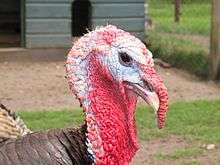snood
English


Etymology
From Middle English snod, from Old English snōd (“headdress, fillet, snood”), from Proto-Germanic *snōdō (“rope, string”), from Proto-Indo-European *snoh₁téh₂ (“yarn, thread”), from *sneh₁(i)- (“to twist, wind, weave, plait”). Cognate with Scots snuid (“snood”), Swedish snod, snodd (“twist, twine”). Compare also Old Saxon snōva (“necklace”), Old Norse snúa (“to turn, twist”), snúðr (“a twist, twirl”), English needle.
Pronunciation
- IPA(key): /snuːd/
- Rhymes: -uːd
Noun
snood (plural snoods)
- A band or ribbon for keeping the hair in place, including the hair-band formerly worn in Scotland and northern England by young unmarried women.
- A small hairnet or cap worn by women to keep their hair in place.
- Sir Walter Scott
- And seldom was a snood amid / Such wild, luxuriant ringlets hid.
- 2006, Thomas Pynchon, Against the Day, Vintage 2007, p. 264:
- serious girls with their hair in snoods entered numbers into logbooks […]
- Sir Walter Scott
- The flap of red skin on the beak of a male turkey.
- 2000, Gary Clancy, Turkey Hunting Tactics, page 8
- A fingerlike projection called a snood hangs over the front of the beak. When the tom is alert, the snood constricts and projects vertically as a fleshy bump at the top rear of the beak.
- 2000, Gary Clancy, Turkey Hunting Tactics, page 8
- A short line of horsehair, gut, monofilament, etc., by which a fishhook is attached to a longer (and usually heavier) line; a snell.
- A piece of clothing to keep the neck warm; neckwarmer.
Quotations
- For quotations of use of this term, see Citations:snood.
Hypernyms
- (hairnet): hairnet
Hyponyms
- (hairnet): shpitzel
Translations
Verb
snood (third-person singular simple present snoods, present participle snooding, simple past and past participle snooded)
- To keep the hair in place with a snood.
- 1792, Robert Burns, "Tam Lin" (a Scottish popular ballad)
- Janet has kilted her green kirtle
A little aboon her knee,
And she has snooded her yellow hair
A little aboon her bree,
- Janet has kilted her green kirtle
- 1792, Robert Burns, "Tam Lin" (a Scottish popular ballad)
Translations
Dutch
Etymology
From Middle Dutch snôde, from Old Dutch *snōthi, from Proto-Germanic *snauþuz (“bald, naked, poor”), from Proto-Indo-European *ksnéw-tu-s, from the root *ksnew- (“to scrape, sharpen”). Cognates include German schnöde and Old Norse snauðr.
Pronunciation
- IPA(key): /snoːt/
(file) - Hyphenation: snood
Inflection
| Inflection of snood | ||||
|---|---|---|---|---|
| uninflected | snood | |||
| inflected | snode | |||
| comparative | snoder | |||
| positive | comparative | superlative | ||
| predicative/adverbial | snood | snoder | het snoodst het snoodste | |
| indefinite | m./f. sing. | snode | snodere | snoodste |
| n. sing. | snood | snoder | snoodste | |
| plural | snode | snodere | snoodste | |
| definite | snode | snodere | snoodste | |
| partitive | snoods | snoders | — | |
Adverbially, snodelijk is also used.